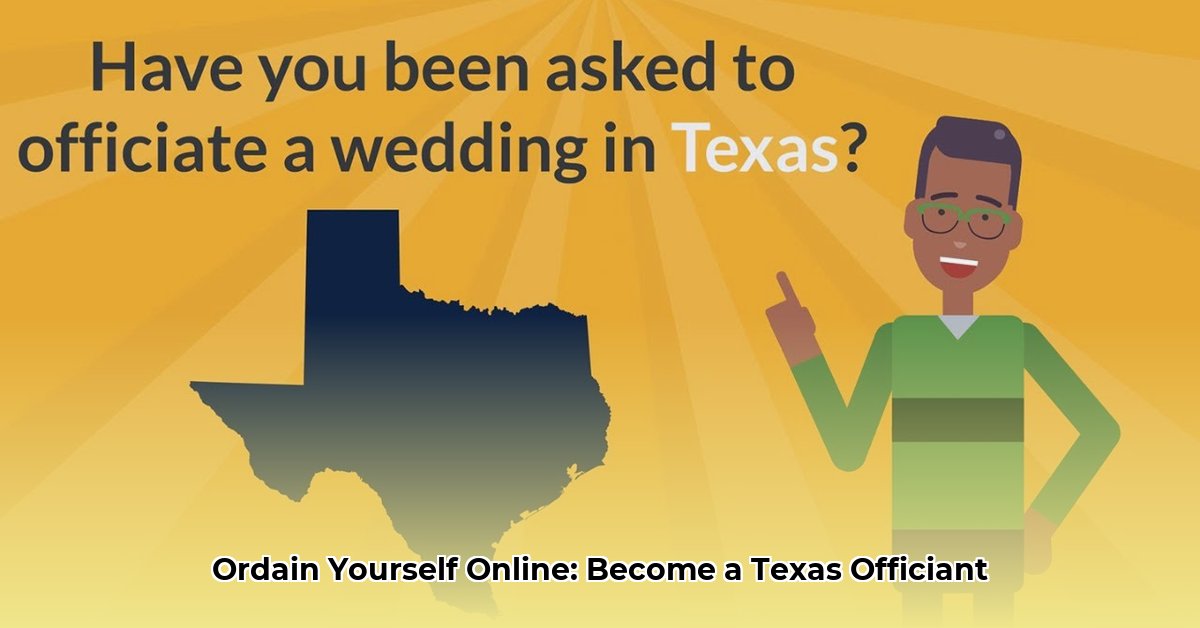
How to Become a Legally Recognized Wedding Officiant in Texas
Dreaming of officiating weddings in Texas? It's easier than you think! This guide provides a simple, step-by-step process to become a legally recognized officiant, focusing on the straightforward path of online ordination. Let's get started on this rewarding journey!
Your Step-by-Step Guide to Officiating Weddings in Texas
Step 1: Choose Your Online Ordination Path
First, you need ordination. Fortunately, Texas doesn't require state-level registration for wedding officiants. Many reputable online organizations offer free and quick ordination. American Marriage Ministries (AMM) is a popular, widely accepted choice. Research options to find one that feels right for you. This step is your crucial first step towards becoming a Texas wedding officiant. Did you know that over 95% of Texas officiants obtain ordination through online services?
Step 2: Complete the Online Ordination Process
Most online ordination processes are incredibly simple. Expect to fill out a brief form with your personal information and agree to their terms of service. Many provide instant ordination, meaning you could be officially ordained in minutes! You'll receive your certificate electronically shortly after completion. It’s that easy—a significant step that opens the door to your officiant career.
Step 3: Understanding Texas Marriage Laws: The Essentials
While Texas doesn't require specific officiant registration, understanding Texas marriage laws is essential. This mainly involves grasping how marriage licenses work and the proper procedures for a legally binding ceremony. This information is readily available online through official state websites and legal resources. This is not a matter of paperwork but a matter of ensuring legal compliance. Think of this as your "legal toolkit" for officiating weddings.
Step 4: Keep Your Ordination Certificate Handy
While not legally mandated in Texas, keep a copy of your ordination certificate for your records. This provides peace of mind and is useful for reference.
Step 5: Optional: Enhance Your Skills with Additional Training
Many ordination organizations provide valuable resources, including ceremony guides, sample scripts, and helpful advice. While not obligatory, utilizing these resources can boost your confidence and proficiency significantly. It’s like having a mentor to guide you in your new role.
What You'll Need: Simple Supplies
- Internet access
- A few minutes of your time
- A genuine desire to help couples celebrate their special day!
Beyond the Basics: Tips for Success
- Network: Connect with other wedding professionals (photographers, planners, venues). Referrals are key to building your client base.
- Develop Your Style: Let your personality shine through. Be fun, formal, or anything in between!
- Set Your Fees: Research market rates to ensure fair compensation for your services.
- Consider Liability Insurance: While not mandatory, insurance provides added protection.
Frequently Asked Questions
| Question | Answer |
|---|---|
| Is becoming a Texas officiant expensive? | No! Many online services offer free ordination. |
| Do I need religious affiliation? | Absolutely not! Religious affiliation is not a requirement in Texas. |
| Where can I find additional information? | Refer to the Texas Family Code §2.202 1 and the websites of online ordination services. Use the official Texas government websites for the most current and accurate information. |
The Rewards of Officiating Weddings
Officiating weddings is a deeply rewarding experience. It's about more than paperwork; it's about being a part of a couple's most significant day, creating lasting memories, and adding joy to their celebration.
Disclaimer: This guide is for informational purposes only. Always verify details with official Texas state resources and consult legal counsel if needed.